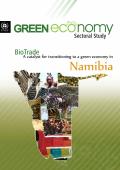
Low carbon growth seeks to promote economic development while keeping emissions low, or lower. Although Ghana is not responsible for the greenhouse effect, low carbon growth can be beneficial to Ghana. In the short term, pursuing low carbon growth helps identify options that have direct economic and development benefits and can open access to international climate support. In the long term, depending on the effect climate change has on prices and trade, low carbon growth may increase the competitiveness of the economy.
Does nature have a price ? How to maximise the monetary value it represents to build another relationship between man and his environment? Can we make the ecological imperative and prosperity of the economy compatible?
This book breaks with the traditional economic thinking, which views nature as a limited stock of resources, for which depletion threatens growth. According to this view based on scarcity, Christian de Perthuis and Pierre-André Jouvet advocate regulatory actions: the services provided by nature, whether they concern climate stability or biodiversity, cannot remain free if one wants to maintain the possibility of growth. Exploring the experimental fields already open on climate and biodiversity, the authors show that there is a pool of innovation and investment for sustainable growth. They bring a new perspective to the issues of energy and environmental transition.
The Bank of France organised on 21 March 2013 a conference on the theme of “green growth”. This concept implies finding a balance between the environment and growth in order to maximise welfare – present and future. This involves applying a weighing-up approach for the present and future through an appropriate discount rate. Given this discount rate, it is up to decision makers to develop and to implement policies to combat climate change, in the most effective way possible.
To achieve this, it is necessary to develop assessment tools for climate policies. In addition, greater global coordination seems necessary today. Although the main responsibility for the increase in greenhouse gas emissions (GHG ) lies currently with developed countries, if emerging and developing countries follow the same pattern of growth, this could significantly worsen the situation; thus a global agreement is paramount.
On a smaller scale, and in the absence of a binding global agreement for the moment, it is up to everyone to try to be more respectful of the environment and businesses have a role to play in addressing the challenge of sustainable development.
Improving information about individual opportunity costs of deforestation agents has the potential to increase the efficiency of REDD when it takes the form of a payment for environmental services scheme. However, objectives pursued in REDD projects may vary across policy makers. Within a theoretical framework, this paper explores the impacts of different policy objectives under two opportunity cost settings: asymmetric and full information. For a policy maker aiming to maximise net income from REDD, having full information may not increase the amount of forest conserved but could lead to a redistribution of rents away from agents. By contrast, for an environmental policy maker focused on maximising the amount of forest conserved under REDD having full information increases the amount of forest conserved while reducing the rents received by agents. For a policy maker pursuing poverty alleviation objectives in REDD-affected communities, having full information makes no difference to overall welfare as rents remain with agents. The amount of deforestation avoided will at least be as high as under asymmetric information.
